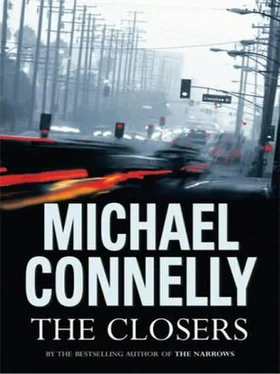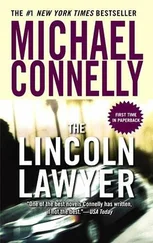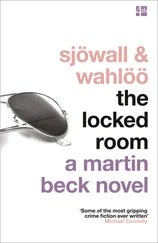AT 7:50 A.M. THE NEXT DAY Bosch was back on the Nickel. He was watching the food line at the Metro Shelter and he had his eye on Robert Verloren back in the kitchen behind the steam tables. Bosch had gotten lucky. In the early morning, it was almost as if there had been a shift change among the homeless. The people who patrolled the street in darkness were sleeping off the night’s failures. They were replaced by the first shift of homeless, the people who were smart enough to hide from the street at night. Bosch’s intention had been to start at the big centers again and go from there. But as he had made his way into the homeless zone after parking again in Japantown, he started showing the photo of Verloren to the most lucid of the street people he encountered and almost immediately started getting responses. The day people recognized Verloren. Some said they had seen the man in the photo around but that he was much older now. Eventually Bosch came across one man who matter-of-factly said, “Yeah, that’s Chef,” and he pointed Bosch toward the Metro Shelter.
The Metro was one of the smaller satellite shelters that were clustered around the Salvation Army and the Los Angeles Mission and designed to handle the overflow of street people, particularly in the winter months when warmer weather in L.A. drew a migration from colder points north. These smaller centers didn’t have the means to provide three squares a day and by agreement specialized in one service. At the Metro Shelter the service was a breakfast that started at 7 a.m. daily. By the time Bosch got there the line of wobbling, disheveled men and women was extending out the door of the chow center and the long rows of picnic-style tables inside were maxed out. The word on the street was that the Metro had the best breakfast on the Nickel.
Bosch had badged his way through the door and very quickly spotted Verloren in the kitchen beyond the serving tables. It didn’t appear that Verloren was doing one particular job. Instead, he seemed to be checking on the preparation of several things. It appeared that he was in charge. He was neatly dressed in a white, double-breasted kitchen shirt over dark pants, a spotless white apron that went down past his knees and a tall white chef’s hat.
The breakfast consisted of scrambled eggs with red and green peppers, hash browns, grits and disc sausages. It looked and smelled good to Bosch, who had left home without eating anything because he wanted to get moving. To the right of the serving line was a coffee station with two large serve-yourself urns. There were racks containing cups made of thick porcelain that had chipped and yellowed over time. Bosch took a cup and filled it with scalding black coffee and he sipped it and waited. When Verloren strode to the serving table, using the skirt of his apron to hold a hot and heavy replacement pan of eggs, Bosch made his move.
“Hey, Chef,” he called above the clatter of serving spoons and voices.
Verloren looked over and Bosch saw him immediately determine that Bosch was not a “client.” As with the night before, Bosch was dressed informally, but he thought Verloren might have even been able to guess he was a cop. He stepped away from the serving table and approached. But he didn’t come all the way. There seemed to be an invisible line on the floor that was the demarcation between kitchen and eating space. Verloren didn’t cross it. He stood there using his apron to hold the near-empty serving pan he had taken from the steam table.
“Can I help you?” he asked.
“Yes, do you have a minute? I would like to talk to you.”
“No, I don’t have a minute. I’m in the middle of breakfast.”
“It’s about your daughter.”
Bosch saw the slight waver in Verloren’s eyes. They dropped for a second and then came back up.
“You’re the police?”
Bosch nodded.
“Can I just get through this rush? We’re putting out the last trays now.”
“No problem.”
“You want to eat? You look like you’re hungry.”
“Uh…”
Bosch looked around the room at the crowded tables. He didn’t know where he would sit. He knew that these sorts of chow halls had the same unspoken protocols as prisons. Add in the high degree of mental illness in the homeless population and you could be crossing some sort of line just by the seat you chose.
“Come back with me,” Verloren said. “We have a table in the back.”
Bosch turned back to Verloren but the breakfast chef was already heading back to the kitchen. Bosch followed and was led through the cooking and prep areas to a rear room where there was an empty stainless steel table with a full ashtray on it.
“Have a seat.”
Verloren removed the ashtray and held it behind his back. It was not like he was hiding it. It was like he was a waiter or a maître d’ and he wanted his table perfect for the customer. Bosch thanked him and sat down.
“I’ll be right back.”
It seemed that in less than a minute Verloren brought a plate back loaded with all the things Bosch had seen on the serving table. When he put down the silverware Bosch saw the shake in his hand.
“Thank you, but I was just thinking, will there be enough? You know, for the people coming through?”
“We’re not turning anybody away today. Not as long as they’re on time. How’s your coffee?”
“It’s fine, thanks. You know, it wasn’t like I didn’t want to sit out there with them. I just didn’t know where to sit.”
“I understand. You don’t have to explain. Let me get those trays out and then we can talk. Is there an arrest?”
Bosch looked at him. There was a hopeful, maybe even pleading look in Verloren’s eyes.
“Not yet,” Bosch said. “But we’re getting close to something.”
“I’ll be back as soon as I can. Eat. I call that Malibu scrambled.”
Bosch looked down at his plate. Verloren went back to the kitchen.
The eggs were good. So was the whole breakfast. No toast, but that would have been asking too much. The break area where he sat was between the cooking area of the kitchen and the large room where two men loaded an industrial dishwasher. It was loud, the noise from both directions ricocheting off the gray tiled walls. There was a set of double doors leading to the back alley. One door was open and cool air came in and kept the steam from the dishwasher and the heat from the kitchen at bay.
After Bosch cleaned his plate and washed it down with the rest of his coffee he got up and stepped into the alley to make a phone call away from all the noise. He immediately saw the alley was an encampment. The rear walls of the missions on one side and the toy warehouses on the other were lined almost end to end with cardboard and canvas shanties. It was quiet. These were probably the self-made shelters of the night people. It wasn’t that there was no room for them in the mission dormitories. It was that those beds came with basic rules attached and the people in the alley did not want to abide by such rules.
He called Kiz Rider’s cell phone number and she answered right away. She was already in room 503 and had just finished distributing the wiretap application. Bosch spoke in a low voice.
“I found the father.”
“Great work, Harry. You still got it. What did he say? Did he recognize Mackey?”
“I haven’t talked to him yet.”
He explained the situation and asked if there was anything new on her end.
“The warrant’s on the captain’s desk. Abel’s going to push him on it if we don’t hear back by ten, and then it goes up the chain.”
“How early did you come in?”
“Early. I wanted to get this done.”
“Did you ever get a chance to read the girl’s journal last night?”
Читать дальше












